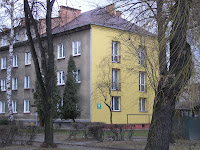
Last night an agent of divine retribution was dispatched from hell to my bedside. What I had done to attract the attentions of hell's minion I neither know, nor care to discuss.
It began with a dream - somehow I was making a video of a family, which was intended to be of a funny, youtube-esqe nature. During the filming of the family and their activities it becomes apparent that the mother and daughter (who are the only people I remember from the dream, although there were many more) typically spoke at cross-purposes, and were alienated from each other. The mother was around 50, a well-dresssed, well-coiffed suburbanite, who was meticulous about her house, lawn, and the pool. The daughter could be early to late twenties, or even early to mid thirties. It is hard to say, as something, be it hard living or a disease, or just a tendency toward chronic bitterness, had prematurely aged her. She had viciously short hair that may have been salt-and-pepper, but I couldn't really say, as she wore a kerchief over her head that reminded you of a cancer victim. That, combined with the drawn, bony face, and the downcast eyes, and the same dirty blue flannel shawl she wore every day combined to create an impression of illness, or at least some sort of deep discomfort.
Despite the appearance of physical weakness, or perhaps just mental exhaustion, the daughter would frequently, almost habitually, engage in activities which seemed miserably calculated in advance to demonstrate her as spontaneous, young, free and desperately fun-loving. Or to demonstrate that her mother's values were not her own. Whatever the driving force behind them, the impression I retain from them was one of awkwardness and slight embarrassment every time I bore witness to one of these scenes, in which the young skeleton in her kerchief and shawl, resembling for all the world one of the extras from Schindler's list, would by one of these displays grimly attempt to convince us all of something fundamental about herself.
The one scene that stays with me happened during a party out by the pool. It was night, and I recall thinking that the pool lights, working their way up through the water, made for a great diffuse lighting that shifted and slid over the subjects. I suppose this is my idea of what a cameraman-cum-director thinks about, though I really would have no idea. I was laying low, on my stomach, the camera practically on the ground, tilted up to catch the action, which in this case was the mother speaking of the mundane details of her impeccable existence. I don't doubt that such impeccability in household matters does indeed occupy a great deal of a person's mind and mental energies. In particular, she spoke of the pool filter, and how frequently it had to be cleaned. The words, typical of dreams, are no longer with me, but she gave the distinct impression of the tribulations she faced in keeping the pool filter free of clogging matter, all of which resulted from people's inattention to what they wore in the pool. Pieces of fuzz, lint, etc, that made one more bead in the cleaning rosary she worked daily.
It was at this moment that the daughter entered the frame, coming through the glass doors from the patio, and walked intentionally across the frame of my shot, and, removing her black leather clogs, sat herself down on the edge of the pool, right in the prominent left foreground of my camera-frame, and despite wearing heavy black cotton leggings, dunked her legs into the pool.
The sheer dream-like improbability of it, that the mother would have been speaking of clothing in the pool, and she should come from out of earshot, and immediately do exactly the thing her mother had been speaking of, seemed to lend something preternaturally sinister to the tension that existed between them. As I continued filming, she made every effort to appear that this was a thoughtless act of carefree pleasure in life, but the tension and rigidity in her back and around her neck seemed to belie this. Her mother came over to her and leaning over, addressed her as "honey," and asked her if she would be getting in the pool.
The simple presence of her mother beside her seemed to nearly push her into the pool by force of repulsion alone. As her mother bent over her and spoke, she reflexively gathered her strength, and pushing down with her arms, prepared to slide into the brightly-lit chlorine water, kerchief, brown-and-maroon plaid skirt, and shawl still in place. My last image of them was the daughter's neck and shoulders tensing to push off the edge, while the mother, still speaking, makes small frantic finger-plucks at the shawl around her daughter's shoulders, hoping to remove it, yet trying not to strangle her with it should she actually go, all the while trying to speak in a soothing voice that is only a thin veneer to the colliding forces moving inside and all around her.
But that was only a dream. I was pulled from the dream by the whining, small, high, screaming more loudly with every second with insistence possible only in machines of destruction boring down upon their targets or a mosquito bored at night. I waved him away with great vigor, wildly threshing the air around him, no doubt tumbling him (her) frantically about, sending her spinning, hopefully, out of range of being attracted back to me. Then I tried to go back to a restless and unhappy sleep.
I don't know if I succeeded or not - I may have, but it seemed not long when the intense, approaching sound of a dentist-drill came closer and closer to my ear. This time I could only muster a single wave at it - I knew it to be hopeless no matter what I did. You can't crush a mosquito in the dark - it takes two hands, anyway, and I could only muster energy to wave one. To vigorously churn the air like last time not only wakes one up unduly, but is completely ineffective. To wave one hand past one's ear may be equally useless, but it does have the advantage of less frustration at having expended lest windmilling energy into the ether.
She was back soon. I don't know how soon. It would be impossible to say. It would be impossible to say how many times I made a cup out of my hand, hoping to "scoop" her in a direction from which she might not return. I realized at one point that she had bitten my left pinky finger, and the persistent itch wound its way through my incoherent thoughts. My periodic dozing moments, if they were more than just simple tired dizziness moments, spun around options of putting my head under the blankets and sweating for a few hours, getting up and doing some work, and turning on the lights, hunting it down and killing it.
I got up after one of these waving incidents, turned on the hallway light, and got a drink of water. My plan was that the light would attract the mosquito out into the entryway, and then I could close the door, and sleep soundly. While in the kitchen I looked at the clock. It was 4:30. In a few hours I would probably get up anyway - why not now? But I didn't - I went back to bed. The next time it woke me (not many minutes later,) I grabbed my pillow, and one of the blankets, and went out to the living room.
I cleared the books off the couch, unfolded it, and tried to crawl under the blanket. It was not folded very well, and so I was cold, and my feet were not covered, and the space where the couch folded let cold air up from below, along my back. I sat up and arranged the covers more meticulously - under and over and stretching down to where it should, and closed my eyes, and began to dream again. I suppose I slept, for there was a period of blankness that I recall with a feeling of gratitude, that probably lasted a half hour before my alarm, which some days ago I had set to 5:30, went off.
I had no intention of getting up at 5:30 today, and how this alarm had suddenly got turned back on is a mystery to me. But experience does seem to show that when the universe has decided to array its forces against you, mysteriously turning on your alarm falls well within the reach of its powers. Getting up or not, I had to get up and go back into the bedroom to turn it off. I couldn't see the face of my wife through the gloomy half-dark, which was just as well. I went back out, and lay down again in the now warm blankets on the couch.
When the mosquito returned I was beyond amazed and demoralized. I had left it in the bedroom long before. Mosquitoes are not, to my knowledge, capable of cognition. How had it managed to find me in another room, past doors that were almost shut? What kind of hideous radar for misery did this creature have that made this feat possible? Did I bring it with me when I shut off the alarm? Had it set the alarm, as bait, so I would have to come back, and it could then follow me to my new resting place? Anything seemed possible at this stage, and I gave up entirely on sleep. I knew then, with the certainty of despair that the condemned has when he actually feels the vibrations of the descending guillotine blade, that divine agents were working against me, sending mosquitoes of supernatural abilities, arming my alarm, and cursing me with tension fraught dreams.
I arose and made the coffee, and washed my face, turned on the computer, and sat down with a flyswatter across my knees. Staring blearily at the screen, I would occasionally hallucinate a movement in my peripheral vision, that was most likely just the smear of sleep sliding across my yellowed vision. As it turned out, I didn't use the flyswatter. She literally rammed into my head, her whining going off in my ears suddenly like a klaxon, and I reached out both hands and clapped frentically once, twice, three times and saw a black ball and the end of a red smear across my hand, and felt a surge of joy that I had at last triumphed over one small gnat.















